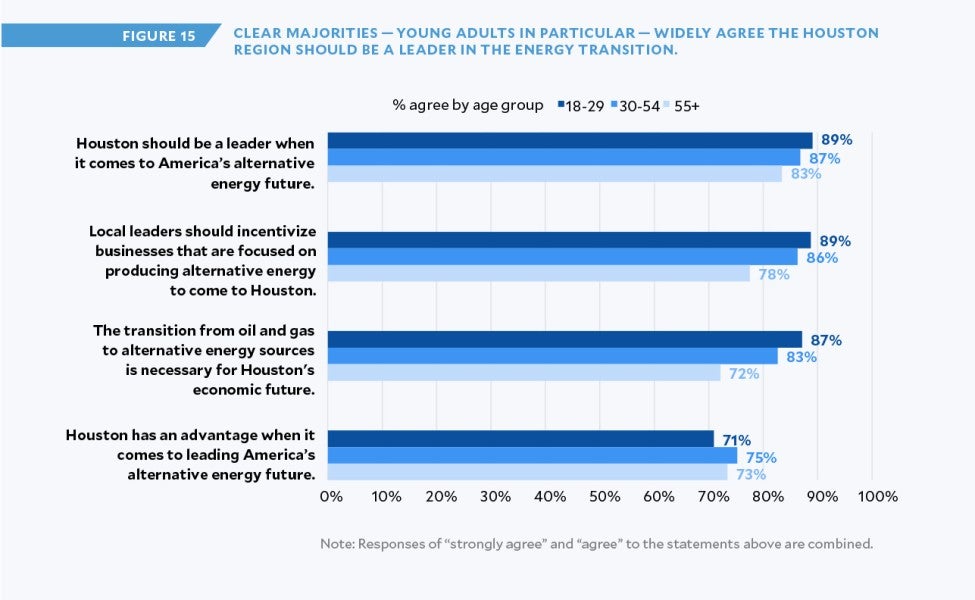Enthusiasm and optimism were expressed across three age groups, and 87% of young adults said the transition from oil and gas to alternative energy sources is necessary for Houston’s economic future.
This post is part of a series highlighting the findings from the 2024 Kinder Houston Area Survey.
The transition is already underway throughout the region. In October of 2023, the Department of Energy selected the HyVelocity Hub, based in Houston, as one of seven regional clean hydrogen hubs in the country. The organization includes academic institutions, energy companies and nonprofits.
In the southeast Houston neighborhood Sunnyside, a former landfill is in the process of being revitalized into one of the largest urban solar farms in the U.S. The Houston Health Department announced on July 30 that it received $20 million in solar power investments from the Environmental Protection Agency. In April, the EPA awarded Harris County with a $250 million “Solar For All” grant that intends to create new jobs in solar power and lower household energy costs.
However, oil and gas remain a driving force in Texas. The Texas Oil & Gas Association’s 2023 annual report highlighted a record year for crude oil supply, exports, production, refining and tax revenue. Oil and gas companies paid $26.3 billion in taxes last year, marking a $1.5 billion increase from 2022.
Some of the world's largest oil and gas corporations have made the Houston area their new home. On Aug. 2, Chevron announced it would begin relocating its headquarters to Houston. Exxon Mobil moved its headquarters Houston in July of 2023.
Jane Stricker, executive director and senior vice president of the Greater Houston Partnership’s Houston Energy Transition Initiative, said the industry is facing a dual challenge: meeting growing global energy demand while also significantly reducing greenhouse gas emissions.
Stricker spoke with the Urban Edge on how Houston’s robust energy industry can adapt to a cleaner future, and the opportunities presented by the transition.
In the 2024 Kinder Houston Area Survey, 73% of respondents believe the city has an advantage when it comes to leading America’s alternative energy future. What are some of those advantages?
Houston is the leading domestic and international center for nearly every segment of our evolving energy industry — exploration, production, transmission, marketing, service, trading, infrastructure and low-carbon technology development. Houston’s greatest advantage in the energy transition comes from both the region’s diversity of energy sources and its unmatched experience in developing and delivering energy to the world.
With more than 4,700 energy-related firms located within the metro area, Houston is home to 38 of the nation’s 85 publicly traded oil and gas exploration and production firms — including 10 of the top 25. The region now boasts over 270 clean-tech or climate-tech startups, including world-leading technologies in carbon capture, geothermal, clean hydrogen and more. In addition, Texas is now the No. 1 state for both wind and solar power generation, with many of those companies now headquartered in Houston.
The energy transition will require strong collaboration and integration across all sectors within the energy industry, and no other city in the world has the breadth and depth of “all of the above” energy knowledge and experience that Houston has. Simply put, Houston is where low-carbon energy meets scale.
How can the energy transition be a job creator in the Houston region?
The energy sector employs more than 130,000 Houstonians, or about 4% of all jobs in the region. Today, nearly half of all direct energy jobs in Houston are associated with lower-carbon energy solutions, and we expect those numbers to continue to grow. But those numbers understate the energy industry’s importance to the region. The sector has a high job multiplier because firms in the industry and their employees purchase a significant amount of goods and services from other businesses in Houston. According to IMPLAN, a model the Greater Houston Partnership uses to calculate the impact that relocations have on the region, every 1,000 jobs in energy support a range of 3,000-5,000 additional jobs in the economy.
As the energy capital of the world, Houston has both a responsibility and an incredible opportunity to lead the transition toward an energy-abundant and low-carbon future, and, in doing so, create new jobs throughout our region. To meet this challenge, it will require energy from all available sources as well as innovative technologies that can reduce or limit the environmental impacts of our energy production and consumption.
What are areas of study or skills that will be necessary for professionals working in the energy transition?
We believe Houston can leverage the best of traditional energy skills to bring all sources of energy to market affordably, reliably and sustainably. This will require both a skilled-craft workforce and professional talent, and many of these skills are not new. Our changing energy industry will continue to need engineers, geoscientists, pipefitters, welders, process operators and more in the future.
One of the ways we’re meeting Houston’s critical pipeline needs is through the Partnership’s UpSkill Houston initiative. It is dedicated to convening employers, training providers, higher education institutions and community organizations with a particular focus on roles that require more than a high school diploma but less than a four-year college degree. We are seeing strong collaboration between employers and educators to ensure that we can continue meet our talent and workforce needs.
What do you believe are steps that can be taken to ensure the energy transition is equitable for job-seekers and communities in our area?
Ensuring equitable growth for the Houston region is an iterative process that will take place over time and involve a broad range of stakeholders. For communities and talent to truly benefit from Houston’s role in the transition to an abundant, low-carbon energy future, it is critical to create an environment where open and productive dialogue can happen for the benefit of all involved.
Best practice in community engagement emphasizes starting with open and transparent communication, whereby a company works to understand and support local concerns, values and goals, with a focus on mitigating disparities. Building connections with community members includes careful, inclusive outreach to representatives of impacted communities and ongoing work to maintain and strengthen those relationships to promote shared benefits. We cover this and a set of best practices in the Houston Energy Transition Initiative’s recently published “Climate Equity Framework and Toolkit for an Equitable Energy Transition in Greater Houston,” which was developed to help foster mutually valuable relationships between leading energy companies with a presence in Houston and the communities they impact. We hope that this report will benefit both companies and communities in Houston.



